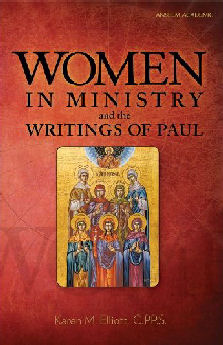
|
Posted December 1, 2010
Book: Women in Ministry and the Writings of Paul Author: Karen M. Elliott, C.PP.S. Anselm Academic, Winona, Minn. 2010. Pp. 105 An Excerpt from the Jacket:
Writes Elliott, “I invite you, whatever your religious background or belief, to encounter there the witness of women of faith throughout the ages, and to encounter Paul, the passionate disciple of Jesus Christ who urged the early Christian communities to focus on oneness in Christ Jesus rather than on that which separates and divides.” An Excerpt from the Book: Women Minister in Paul The plethora of citations in the undisputed letters of Paul makes it abundantly clear that Paul holds the ministry of women in high esteem. The terms that he uses to describe women’s leadership positions and their ministries in the early Church are the same terms he applies to men and to himself and his ministry. These terms include “apostle,” “deacon,” (not “deaconess”), “co-worker,” “countryman,” “yokemate,” and “hard workers.” Undoubtedly, the presence of Paul’s commendations of women in his writings were as striking in the first century as theyh are in the twenty-first and would have been difficult to dismiss before Church tradition found ways to ignore and sadly even to eradicate them. In truth, the role of women in the Pauline communities was much greater and more nearly equal to that of men than one finds in contemporary Christianity. . . . Chloe For it has been reported to me about you, my brothers, by Chloe’s people, that there are rivalries among you (1 Cor. 1:11). Since koinonia is the foundation of Christian life and its only authentic expression, Paul’s primary concern in this passage is lack of unity among the Christians at Corinth. Regrettably, we know little or nothing about Chloe, save that Paul felt that she was well acquainted with the Corinthian situation and that her alarming report of conditions there was thoroughly reliable. Since Paul recognizes those who came to him with her concerns, it is likely that Chloe was a leader in the Christian community in Corinth and probably the head of a church that gathered in her home. Paul responds to the serious concerns that the messengers presented in Chloe’s name, addressing the rivalries that threatened the new community of faith at Corinth. Table of Contents: 1. The Ministry of Women in the New Testament Women as ministers in the Gospel Mary Magdalene: apostle to the apostles Initial impressions of Paul’s view of women as ministers 2. Paul and his times The person of Paul Paul’s cultural context Religion and philosophy Legacy and influence 3. Paul’s theology of baptism Baptism: a beginning Baptismal formulas Freedom in Christ 4. Scriptural evidence of Paul’s views on women Paul’s use of feminine imagery Equality in marriage Equality in ministry Women ministers in Paul Regarding women’s veils Women keeping silent in churches A red herring Concluding reflections 5. Post New Testament to modern times The first five centuries Deaconesses Abbesses Mystics The later centuries |
|
